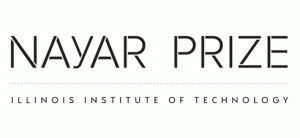 Illinois Institute of Technology has announced that the Data-Driven Crime Prevention Program and Microfluidic Drug Microbiota Interaction Platform teams have been selected as the finalists that will advance to the second phase of the Nayar Prize II competition. Each team will be credited with $100,000 over the next year, at which time the jury will determine which team will advance to the final round of funding.
Illinois Institute of Technology has announced that the Data-Driven Crime Prevention Program and Microfluidic Drug Microbiota Interaction Platform teams have been selected as the finalists that will advance to the second phase of the Nayar Prize II competition. Each team will be credited with $100,000 over the next year, at which time the jury will determine which team will advance to the final round of funding.
The Microfluidic Drug Microbiota Interaction Platform team, composed of Abhinav Bhushan (biomedical engineering), Genoveva Murillo (IITRI), and Rajendra Mehta (biology/IITRI), is building a discovery platform to examine the interactions between approved drugs and microbiota in the digestive system using a more physiologically relevant model of the intestine. As a step towards personalized medicine, patients will be able to assess how their individual microbiota can influence the efficacy and toxicity of the pharmaceutical drugs they are taking.
During Phase 1 of the competition, the Microbiota Platform team made significant progress towards the construction of a microfluidic intestinal platform and successfully cultured intestinal cells on the membrane of the device. The team will use the funding to work towards accomplishing phase II milestones and continue nurturing the collaborations.
The Data-Driven Crime Prevention team, consisting of Miles Wernick (electrical and computer engineering), Lori Andrews (Chicago-Kent), and Yongyi Yang (electrical and computer engineering), is developing a program in Elgin, Illinois, to offer social services to individuals at serious risk for involvement in crime, with modern machine learning technology providing an informational tool to help identify candidates for this assistance. The team is establishing a legal-ethical framework for such approaches, and influencing the national public debate on crime.
During Phase 1, the team created an algorithm that accurately identifies a small number of individuals in Elgin at extreme crime risk based on recent incidents and completed a detailed legal-ethical analysis. The funding in phase II will support implementation and assessment of the program, refinements of the algorithm, and raising public awareness of these issues.
The team that successfully achieves the benchmarks/performance metrics that it has established, and that the Nayar Prize Steering Committee has approved, will receive $100,000 for the final year of the competition and will be eligible for the final prize of $500,000.
Much thanks to the third team, Cyberbullying Early Warning and Response System, for their contributions during the first phase of the competition, as well as the jury for reviewing the work and selecting the Phase 2 finalists. The university remains grateful to Trustee Madhavan Nayar (M.S. IE ’68), his wife, Teresa, and the Nayar Family Foundation for their continued generosity and support of the Nayar Prize program.
